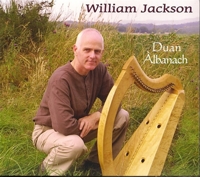Duan
Àlbanach by William Jackson
Buy this album now CD: £12.00 + p&p |
| William Jackson: profile & list of sheet music and recordings available from Creighton's Collection |
Duan Àlbanach
1. Joseph on the Golden Strand
2. Shining Bright / Lady Margaret
3. An Honourable Peace / The Drip
4. Blue Ribbon / Lady Dolly Primrose's Minuet
Duan Àlbanach (The Scottish Poem)
5. Mons Graupius
6. Dalriada
7. Dunnichen
8. The Bannock Burn
9. Lia Fail (The Stone of Destiny)
CD Notes
William Jackson
William Jackson was a founding member of the top Scottish band Ossian in 1976. Over the past 20 years he has established a growing reputation as a solo performer on the Scottish harp, and as a composer specialising in the combination of classical and traditional music. Scotland's history and landscape often inspire his compositions.
In 1999 William won the Song for Scotland
Competition with his new anthem 'Land of Light'. His larger compositions
combining classical and traditional music include;
The Wellpark Suite 1985
St Mungo 1990
Gaidhealtachd 1991
Inchcolm 1995
A Scottish Island 1996
1. Joseph on The Golden Strand
2. Shining Bright/Lady Margaret(or Maggie's Fine
Mattress)
I finally got round to writting some tunes
for my grandson Joseph and two daughters, Brigit and Margaret.
3. An Honourable Peace/The Drip
The Drip was written for the Dripolator
Coffee House in Black Mountain, North Carolina, where I have
many fine sessions.
4. Blue Ribban/Lady Dolly Primrose's Minuet
Duan Àlbanach (The Scottish Poem) Composed and Orchestrated by William Jackson
This new work by William is inspired by the ancient poem, Duan Albanach, which he has set to music in the second movement. The theme of the poem was the past history of the land that came to be inhabited by the Scottish Gaels, the Àlbanach. Like the poem, this composition illustrated some turning points or milestones which shaped the people and the land we know today as Scotland.
5. Mons Graupius
In 84 AD 13,000 Roman soldiers under the command of
Agricola, met in battle against a force of 30,000 Caledonian
warriors led by Calgacus. 10,000 Caledonians fell and fewer than
400 Romans were slain. History suggests that this may have been a turning
point which taught the Caledonians not to confront the Romans in open battle,
but that swift raiding parties of well armed guerillas were more effective
in stopping and turning back the Roman advance. The piece starts with the
sound of the Carnyx, the ancient horn that was used by the Celts in battle.
6. Dalriada
The Scots from Ireland found the Argyll Lands attractive
for settlement, and so many came there in the 6th century that
their new land was named after the place they had left, Dalriada,
with their capital at Dunadd.
7. Dunnichen
Nechtansmere, near the present town of Dunnichen in Angus
was, in 685 AD, the scene of one of the most important battles
in all Scottish history. Aethelfrith, king of the Angles, was
defeated and slain in a crushing and decisive Pictish victory. The victory
of the Pict chief Brude was so great that the Angles had to giveup all
further attempts to move deeper into Pict territory.
8. The Bannock Burn
This is a musical tribute for this silent witness, in 1314
at the most crucial military success in Scottish history. This
piece is for Rosemary.
9. Lia Fail (The Stone of Destiny)
This slab of stone that has long courted controversy, was reputed to have been the pillow on which Jacob had his dream about angels climbing up and down a ladder. It was claimed to have been transported to Tara in Ireland, on to Dalriada and then Iona amongst other places, as part of its participation in the coronation of many kings and as a symbol of Nationhood. This final movement follows the journey of the stone.Credits
All tracks Mill Publishing.
All tracks composed by William Jackson except, numbers 3,4,
''Lady Dolly Primrose's Minuet'', trad arr by William Jackson
Gaelic translation of ''Duan Albanach'' by Mairi MacInnes.
Words for ''Lia Fain'' by Eildh MacKenzie.
Harps used on this recording: Gut strung Raven by Jack Yule and
Triplett Eclipse nylon and Triplett wire harp.
Mandola on track 1, and whistles on track 1,2 and 4 played by
William Jackson.
Tracks 1-4 recorded at Braidstream Studios, Asheville, North
Carolina, Sept 2003.
Engineered by Adam Johnson. Mastered by Calum Malcolm.
Photographs of the Aberlemno Stones & William Jackson by
W. Jackson.
Concert photographs by Rosemary Jackson, Heron design by Steve
Triplett.
Special thanks to Colin Hynd and all at Celtic Connections(www.celticconnections.co.uk),
and also to Mairi MacInnes, Kevin McCrae and Fiona Ritchie.
Commissioned by Celtic Connections and recorded live at The
Glasgow Royal Concert Hall on 16th January 2002.
Featuring:
William Jackson : Clarsach, Whistle
Alasdair Fraser : Fiddle
Iain MacDonald : Highland pipes, Flute
Mackenzie : Vocals
Jerry O'Sullivan : Uillean pipes, Whistle
Joseph Sobol : Guitar, Cittern
Paul Jennings : Percussion
John Kenny : Carnyx
Mill Records 2003
The Lodge
Gardyne
Forfar
Angus DD8 2SQ
Scotland
Tel +44(0)1241828956
email: send e-mail
| Instruments: | Celtic Harp / Ensemble |
| Genre: | Contemporary Scottish |
| Format: | CD |
| Our Ref: | A0265 |
| MCPS: | MRCD018 |
| Label: | Mill Records |
| Year: | 2003 |
| Origin: | Scotland |
 "William
Jackson’s earlier extended compositions are well known...The
Wellpark Suite and St Mungo Suite and Inchcolm. This latest offering
centres on a setting of the Scottish poem Duan Albanach and is
brought up to CD length by a number of shorter individual pieces.
This is very pleasant, tuneful and in places, quite memorable music."
"William
Jackson’s earlier extended compositions are well known...The
Wellpark Suite and St Mungo Suite and Inchcolm. This latest offering
centres on a setting of the Scottish poem Duan Albanach and is
brought up to CD length by a number of shorter individual pieces.
This is very pleasant, tuneful and in places, quite memorable music."